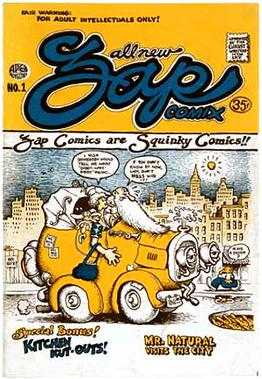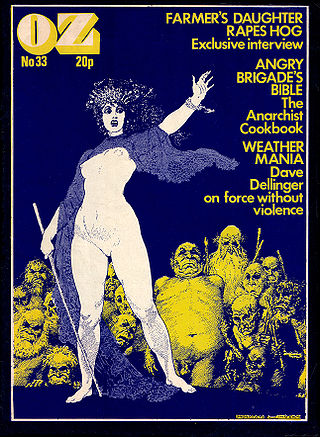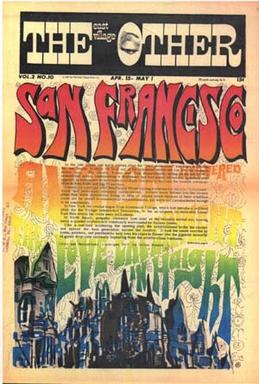Related Research Articles

National Lampoon was an American humor magazine that ran from 1970 to 1998. The magazine started out as a spinoff from The Harvard Lampoon. National Lampoon magazine reached its height of popularity and critical acclaim during the 1970s, when it had a far-reaching effect on American humor and comedy. The magazine spawned films, radio, live theater, various sound recordings, and print products including books. Many members of the creative staff from the magazine went on to contribute creatively to successful media of all types.

Patrick Jake O'Rourke was an American author, journalist, and political satirist who wrote twenty-two books on subjects as diverse as politics and cars and etiquette and economics. Parliament of Whores and Give War a Chance both reached #1 on the New York Times bestseller list.
Freedom is a London-based anarchist website and biannual journal published by Freedom Press which was formerly either a monthly, a fortnightly or a weekly newspaper.

Underground comix are small press or self-published comic books that are often socially relevant or satirical in nature. They differ from mainstream comics in depicting content forbidden to mainstream publications by the Comics Code Authority, including explicit drug use, sexuality, and violence. They were most popular in the United States in the late 1960s and 1970s, and in the United Kingdom in the 1970s.

The Observer is a British newspaper published on Sundays. It is a sister paper to The Guardian and The Guardian Weekly, having been acquired by their parent company, Guardian Media Group Limited, in 1993. First published in 1791, it is the world's oldest Sunday newspaper.

The Washington Blade is an LGBT newspaper in the Washington metropolitan area. The Blade is the oldest LGBT newspaper in the United States and third largest by circulation, behind the Philadelphia Gay News and the Gay City News of New York City. The Blade is often referred to as America's gay newspaper of record because it chronicled LGBT news locally, nationally, and internationally. The New York Times said the Blade is considered "one of the most influential publications written for a gay audience."

The Comics Journal, often abbreviated TCJ, is an American magazine of news and criticism pertaining to comic books, comic strips and graphic novels. Known for its lengthy interviews with comic creators, pointed editorials and scathing reviews of the products of the mainstream comics industry, the magazine promotes the view that comics are a fine art, meriting broader cultural respect, and thus should be evaluated with higher critical standards.

The Baltimore Sun is the largest general-circulation daily newspaper based in the U.S. state of Maryland and provides coverage of local, regional, national, and international news.

An American comic book is a thin periodical originating in the United States, on average 32 pages, containing comics. While the form originated in 1933, American comic books first gained popularity after the 1938 publication of Action Comics, which included the debut of the superhero Superman. This was followed by a superhero boom that lasted until the end of World War II. After the war, while superheroes were marginalized, the comic book industry rapidly expanded and genres such as horror, crime, science fiction and romance became popular. The 1950s saw a gradual decline, due to a shift away from print media in the wake of television and the impact of the Comics Code Authority. The late 1950s and the 1960s saw a superhero revival and superheroes remained the dominant character archetype throughout the late 20th century into the 21st century.

The terms underground press or clandestine press refer to periodicals and publications that are produced without official approval, illegally or against the wishes of a dominant group. In specific recent Asian, American and Western European context, the term "underground press" has most frequently been employed to refer to the independently published and distributed underground papers associated with the counterculture of the late 1960s and early 1970s in India and Bangladesh in Asia, in the United States and Canada in North America, and the United Kingdom and other western nations. It can also refer to the newspapers produced independently in repressive regimes. In German occupied Europe, for example, a thriving underground press operated, usually in association with the Resistance. Other notable examples include the samizdat and bibuła, which operated in the Soviet Union and Poland respectively, during the Cold War.

The East Village Other was an American underground newspaper in New York City, issued biweekly during the 1960s. It was described by The New York Times as "a New York newspaper so countercultural that it made The Village Voice look like a church circular".

The Oracle of the City of San Francisco, also known as the San Francisco Oracle, was an underground newspaper published in 12 issues from September 20, 1966, to February 1968 in the Haight-Ashbury neighborhood of that city. Allen Cohen (1940–2004), the editor during the paper's most vibrant period, and Michael Bowen, the art director, were among the founders of the publication. The Oracle was an early member of the Underground Press Syndicate.
Washington Jewish Week (WJW) is an independent community weekly newspaper whose logo reads, "Serving the nation's capital and the greater Washington Jewish community since 1930." Its main office is located in Rockville, Maryland, a Maryland suburb of the District of Columbia.

Q-Notes is a lesbian, gay, bisexual and transgender (LGBT) newspaper serving North Carolina and South Carolina. It is based in Charlotte, North Carolina. Published every other week, it has a circulation of 11,000 print copies and is the largest print publication serving the LGBT community in the American Southeast. The paper traces its origins to the monthly newsletter of the Queen City Quordinators, a Charlotte LGBT organization, which they began publishing in 1983. In 1986, Qnotes changed to a monthly tabloid. In 2006, it merged with the Raleigh, N.C. LGBT newspaper The Front Page.
The Columbus Free Press is an American alternative journal published in Columbus, Ohio, since 1970. Founded as an underground newspaper centered on anti-war and student activist issues, after the winding down of the Vietnam War it successfully made the transition to the alternative weekly format focusing on lifestyles, alternative culture, and investigative journalism, while continuing to espouse progressive politics. Although published monthly, it has also had quarterly, bi-weekly and weekly schedules at various times in its history, with plans calling for a return to a weekly format by the end of 2014.

Variety is an American magazine owned by Penske Media Corporation. It was founded by Sime Silverman in New York City in 1905 as a weekly newspaper reporting on theater and vaudeville. In 1933, Daily Variety was launched, based in Los Angeles, to cover the motion-picture industry. Variety's website features entertainment news, reviews, box office results, plus a credits database, production charts and film calendar.

Socialist Worker is the name of several newspapers currently or formerly associated with the International Socialist Tendency (IST). It is a weekly newspaper published by the Socialist Workers Party (SWP) in the United Kingdom since 1968, and a monthly published by the International Socialists in Canada. It was a monthly published by the International Socialist Organization (ISO) in the United States from 1977 to 2019, and a biweekly published by the Socialist Workers Party in Ireland, a quarterly published by the International Socialist Organisation in Zimbabwe and a monthly published by the former International Socialist Organisation in Australia. Socialist Worker was also the name of an IST political group in New Zealand.

Fag Rag was an American gay men's newspaper, published from 1971 until circa 1987, with issue #44 being the last known edition. The publishers were the Boston-based Fag Rag Collective, which consisted of radical writers, artists and activists. Notable members were Larry Martin, Charley Shively, Michael Bronski, Thom Nickels, and John Mitzel. In its early years the subscription list was between 400 and 500, with an additional 4,500 copies sold on newsstands and bookstores or given away.

The clandestine press of the French Resistance was collectively responsible for printing flyers, broadsheets, newspapers, and even books in secret in France during the German occupation of France in the Second World War. The secret press was used to disseminate the ideas of the French Resistance in cooperation with the Free French, and played an important role in the liberation of France and in the history of French journalism, particularly during the 1944 Freedom of the Press Ordinances.
Herbert "Herb" P. Weiss is an American author and journalist. He is best known for his work as a writer and as an arts and cultural ambassador for the city of Pawtucket.
References
- ↑ P.J. O'Rourke (1995). Age and Guile Beat Youth, Innocence and a Bad Haircut. Atlantic Monthly Press, New York. p. 7. ISBN 0-87113-653-8.
- ↑ Larry Evams (November 28, 2010). "The Next Page". Pittsburgh Post-Gazette. Retrieved April 6, 2011.
- ↑ Nast, Lenora Heilig. Baltimore: A Living Renaissance (Historic Baltimore Society, 1982), p. 113.
- ↑ Charles D'Adamo (Winter 2009–2010). "From Underground Press to Indymedia". Indypendent Reader. No. 13. Retrieved April 6, 2011.
- ↑ Jean Marbella (April 30, 1991). "After 20-year absence, newspaper 'Harry' returns to provide alternative voice". The Baltimore Sun. Retrieved April 6, 2011.